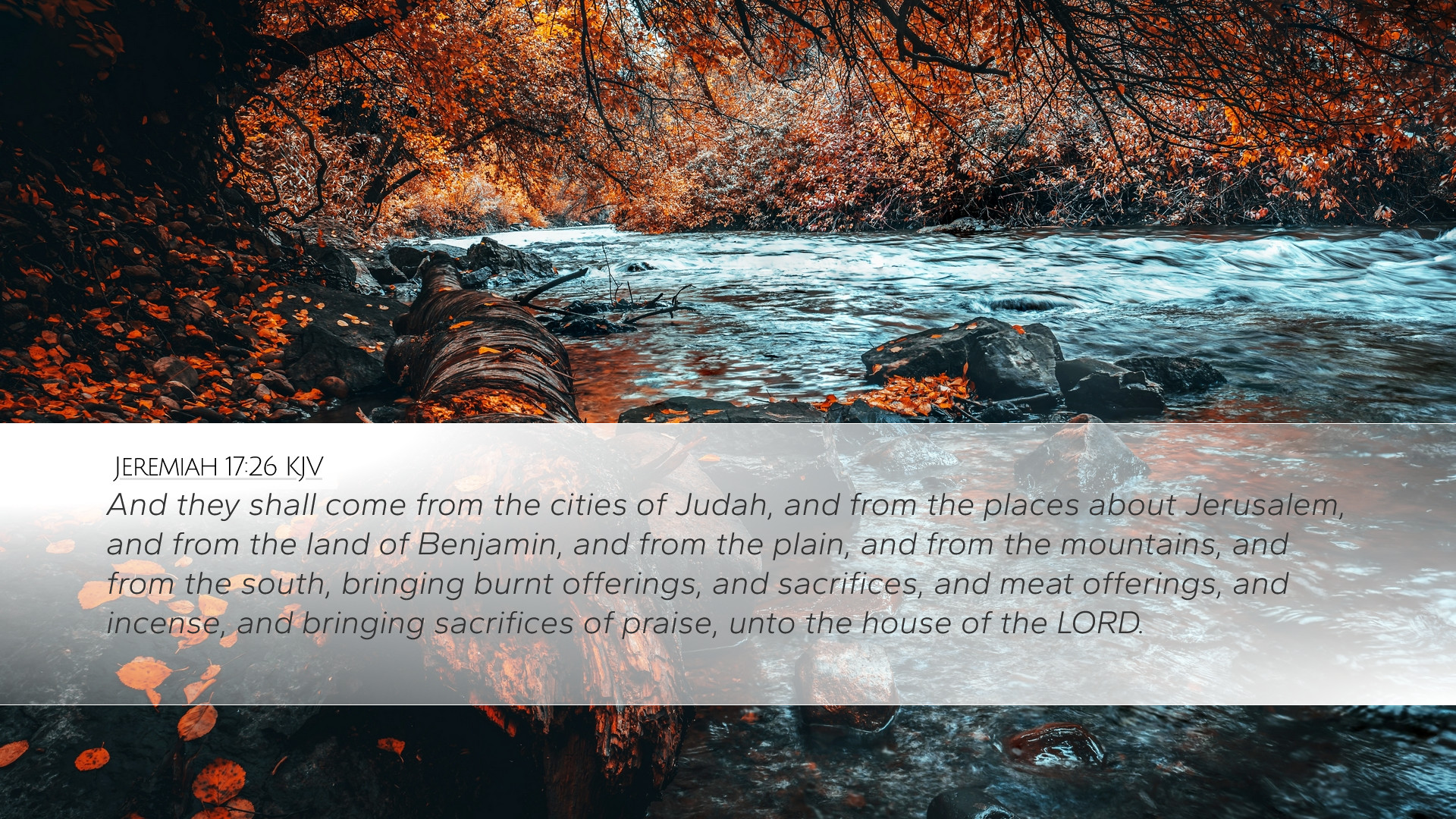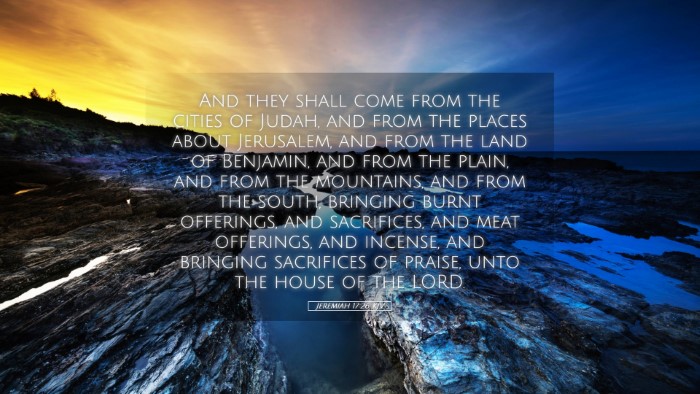Commentary on Jeremiah 17:26
Jeremiah 17:26 states: "And they shall come from the cities of Judah, and from the places about Jerusalem, and from the land of Benjamin, and from the plain, and from the mountains, and from the south, bringing burnt offerings, and sacrifices, and meat offerings, and incense, and bringing sacrifices of praise unto the house of the Lord."
This verse captures a profound element of worship and community coming together before the Lord, highlighting the various groups that the people of Judah and Jerusalem represent. Here we will explore the implications of this verse through insights from public domain commentaries.
Contextual Significance
The prophet Jeremiah speaks during a turbulent time for Judah, as they face not only external threats but also internal spiritual decay. Understanding the historical backdrop is crucial in grasping the depth of this proclamation.
-
Geographical Diversity:
The reference to various geographical locations ("cities of Judah," "places about Jerusalem," etc.) suggests a call for collective worship from a community fragmented by sin and idolatry.
As Matthew Henry highlights, the gathering reflects a unifying pull toward holiness amidst diverse backgrounds.
-
Theological Implications:
Jeremiah's message embodies a structural relationship between worship and repentance. As noted by Albert Barnes, the bringing of offerings signifies the return to God, indicating a restoration of covenantal fidelity that had been broken.
Types of Offerings
The offerings mentioned—burnt offerings, sacrifices, meat offerings, and incense—are diverse and significant. Each type has its own theological weight and emotional resonance.
-
Burnt Offerings:
These offerings symbolize total consecration to God. According to Adam Clarke, the burnt offering, entirely consumed by fire, represents the complete surrender of the offeror to God’s will.
-
Meat Offerings:
Reflecting the provisions of God, meat offerings served as a token of gratitude. Clarke elaborates that this offering represents acknowledgment of God’s goodness, particularly in sustenance.
-
Incense:
Incense symbolizes prayer and the sweet aroma of worship rising to God. Henry suggests that the incense signifies the people’s heartfelt prayers and desires being presented before the Almighty.
Spiritual Reflection
The act of bringing these offerings is not merely a ritual obligation but reflects a deeper relationship between God and His people.
-
Renewal of Covenant:
This verse can be seen as a foreshadowing of Christ's ultimate sacrifice, where all offerings culminate in His body, fulfilling the covenant. Barnes emphasizes that this foreshadowing points to a restatement of God’s desire for a relationship with humanity.
-
Call to Unity:
The gathering from different regions illustrates a call for unity among God’s people. Henry notes that our spiritual lives are interconnected through our worship and service.
-
Rejection of Idolatry:
As mentioned earlier, the context of this verse involves the people turning away from idolatry. This act of coming together denotes a seeking of God after a period of rejection. Recovery in worship is essential for an authentic relationship with the Lord.
Practical Application
For contemporary believers, Jeremiah 17:26 is a call to renewal in every form of engagement with God, encouraging both individual and communal worship.
-
Corporate Worship:
Just as the Israelites gathered from diverse areas, so should modern congregations gather for worship, highlighting the importance of community in spiritual practices.
-
Acts of Offering:
The types of offerings mentioned can be metaphorically expanded. How can we express our gratitude, devotion, and commitment today? Pastors and leaders should guide congregations in understanding the importance of a holistic approach to offering—in time, service, and resources.
-
Prayer as Incense:
The reference to incense brings to mind the importance of prayer in the life of a believer. Clarke notes that prayer transcends mere requests; it is intimacy with God, akin to the incense that fills the temple.
Conclusion
Jeremiah 17:26 challenges contemporary believers to reflect on their relationship with God. Through a rich tapestry of worship expressions and communal involvement, we must respond to the divine invitation to bring our offerings into the house of the Lord.


